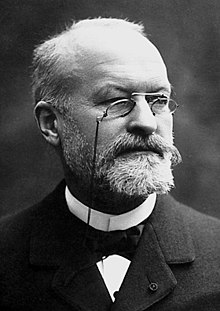Charles Louis Alphonse Laveran
| Charles Louis Alphonse Laveran | |
|---|---|
 |
|
| Born |
18 June 1845 Paris, France |
| Died | 18 May 1922 (aged 76) Paris, France |
| Resting place |
Cimetière du Montparnasse 48°50′N 2°20′E / 48.84°N 2.33°E |
| Nationality | France |
| Fields |
Tropical medicine Parasitology |
| Institutions |
School of Military Medicine of Val-de-Grâce Pasteur Institute |
| Alma mater | University of Strasbourg |
| Known for | Trypanosomiasis, malaria |
| Notable awards | Nobel Prize in Physiology or Medicine (1907) |
| Spouse | Sophie Marie Pidancet |
| Signature | |
Charles Louis Alphonse Laveran (18 June 1845 – 18 May 1922) was a French physician who won the Nobel Prize in Physiology or Medicine in 1907 for his discoveries of parasitic protozoans as causative agents of infectious diseases such as malaria and trypanosomiasis. Following his father, Louis Théodore Laveran, he took up military medicine as profession. He obtained his medical degree from University of Strasbourg in 1867.
At the outbreak of the Franco-Prussian War in 1870, he joined the French Army. At the age of 29 he became Chair of Military Diseases and Epidemics at the École de Val-de-Grâce. At the end of his tenure in 1878 he worked in Algeria, where he made his major achievements. He discovered that the protozoan parasite (Plasmodium) was responsible for malaria, and that Trypanosoma caused trypanosomiasis or African sleeping sickness. In 1894 he returned to France to serve in various military health services. In 1896 he joined Pasteur Institute as Chief of the Honorary Service, from where he received the Nobel Prize. He donated half of his Nobel money to establish Laboratory of Tropical Medicine at the Pasteur Institute. In 1908 he founded the Société de Pathologie Exotique.
Laveran was elected to French Academy of Sciences in 1893, and was conferred Commander of the National Order of the Legion of Honour in 1912.
Alphonse Laveran was born at Boulevard Saint-Michel in Paris, to parents Louis Théodore Laveran and Marie-Louise Anselme Guénard de la Tour Laveran. He was an only son with one sister. His family was in a military environment. His father was an army doctor and a Professor of military medicine at the École de Val-de-Grâce. His mother was the daughter of an army commander. At a young age his family went to Algeria to accompany his father's service. He was educated in Paris, and completed his higher education from Collège Saint Barbe and later from the Lycée Louis-le-Grand. Following his father he chose military medicine and entered the Public Health School at Strasbourg in 1863. In 1866 he became a resident medical student in the Strasbourg civil hospitals. In 1867 he submitted a thesis on the regeneration of nerves and earned his medical degree from the University of Strasbourg.
...
Wikipedia

